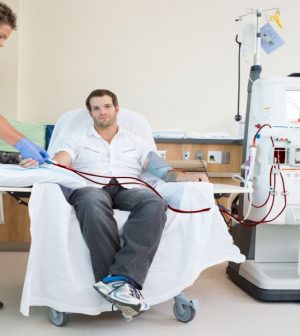- Could Your Grocery Store Meat Be Causing Recurring UTIs?
- Are You Making This Expensive Thermostat Error This Winter?
- Recognizing the Signs of Hypothyroidism
- 10 Strategies to Overcome Insomnia
- Could Artificial Sweeteners Be Aging the Brain Faster?
- Techniques for Soothing Your Nervous System
- Does the Water in Your House Smell Funny? Here’s Why
- Can a Daily Dose of Apple Cider Vinegar Actually Aid Weight Loss?
- 6 Health Beverages That Can Actually Spike Your Blood Sugar
- Treatment Options for Social Anxiety Disorder
CPR Not Always Given at Dialysis Clinics When Needed

When kidney failure patients undergoing treatment at dialysis clinics suffer cardiac arrest, the clinic staff usually jumps in to perform lifesaving CPR, but not always, a new study finds.
“It is reassuring that bystander CPR was associated with improved outcomes in dialysis clinics just as it is in other settings, but it is concerning that the rate of dialysis staff-initiated CPR isn’t closer to 100 percent, considering that all staff should be CPR-trained,” said study author Dr. Patrick Pun, from Duke University, in Durham, N.C.
More research is needed to determine why this is so, the study authors said in a news release from the American Society of Nephrology.
For the study, Pun’s team examined the cases of 398 kidney failure patients who suffered cardiac arrest at outpatient dialysis clinics in the southeastern United States between 2010 and 2016. The study did not include patients with “do not resuscitate” orders.
Before emergency medical services arrived, dialysis clinic staff started CPR in 81 percent of the cases and used defibrillators in 52 percent of the cases, the findings showed.
Clinic staff-initiated CPR was associated with a three times higher chance of survival and a favorable brain result when a patient left the hospital. There was no association between staff defibrillator use and patient outcomes, according to the report.
Staff were more likely to start CPR if they were in a larger dialysis clinic, when patients were men, and when they saw cardiac arrests occur, the researchers reported.
“Further research is needed to understand what barriers to providing CPR exist in the unique environment of the dialysis clinic in order to improve CPR delivery to patients,” Pun said in the news release.
Sudden cardiac arrest, which is when the heart suddenly stops beating, is the leading cause of death among patients on dialysis, accounting for more than 25 percent of all deaths and occurring at a rate 20 times higher than in the general population, the study authors noted.
Cardiac arrests occur more frequently on days that patients receive dialysis treatment, often while they are at outpatient dialysis clinics. Nearly half of patients in these cases do not survive long enough to be admitted to the hospital, the researchers said.
The report was published online Feb. 7 in the Journal of the American Society of Nephrology.
More information
The National Kidney Foundation has more on dialysis.
Source: HealthDay
Copyright © 2026 HealthDay. All rights reserved.










